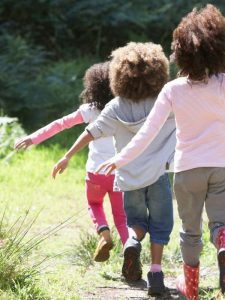
Imagine a classroom where mud kitchens, outdoor color walks, and shady trees are just as much a part of the day as crayons and sensory tables. At Big Steps Little Feet Early Learning & Nature Preschool in Ada, Michigan, children are thriving with a nature-based curriculum. Outdoor play is beneficial for early childhood development, especially for children under five. It boosts physical health, cognitive skills, social abilities, emotional well-being, and creativity according to the Natural Learning Initiative. Amy Quakkelaar, Center Director, and Jessica White-Hatinger, Director of Operations at Big Steps, Little Feet understand this well. Last year, they launched a nature-based preschool program where children spend up to three hours outside daily.
The Center has 16 classrooms and is a voluntary participant in Great Start to Quality. Great Start to Quality (GSQ) helps strengthen high quality early learning experiences for Michigan children by supporting early care and education providers and helping families connect with the best options for their children. To learn more, visit the Great Start to Quality Website.
“The outdoors lends itself to quality programming for our Preschoolers so well,” said Amy. “All the story times are outside; they draw their letters in dirt instead of a salt tray. There are lots of ways we can get those educational indicators of quality in an outdoor environment. In fact, because we see disruptive behavior dimmish outside, the learning environment is enhanced for everyone.” Jessica added that outdoor time benefits not just the preschool children but also the staff. The shift to outdoor education has also impacted the infant and toddler programs. Jessica shared that the infant and toddler teachers were talking about the weekly topic with children and families and spending more time outdoors.
Nature-based activities enhance cognitive growth, stimulating curiosity and problem-solving skills. Big Steps, Little Feet has a Nature Instructor who provides themed educational activities for the preschool classes each week. Research reported by the University of Exeter in 2021 supports that outdoor play develops strong observational skills and attention spans. Activities like asking children how many different greens or browns they can find on a color walk are not only entertaining but also helps children develop observational and language skills. 
Unstructured outdoor play allows children to learn at their own pace, building social bonds and sparking creativity. Both Amy and Jessica shared that they have observed children engaging in unstructured play that helped build social bonds and led to dramatic play in the Mud Kitchen, an initiative of Amy’s. “You see the children making recipes in the mud kitchen. Three rocks, some dirt and a stick end up being cupcakes.” Such play fosters social skills like sharing and cooperation, critical for friendships. Moreover, outdoor play reduces stress and anxiety, boosting emotional well-being. Harvard Graduate School of Education notes that imaginative play develops language skills and cognitive flexibility.
Incorporating outdoor play into daily routines promotes comprehensive child development whether at home or in child care settings. Safe and engaging outdoor environments are vital. Resources like www.1000hoursoutside.com offer ideas for outdoor activities as well as helping to track time and celebrate time spent outdoors, helping foster a love for nature and well-rounded growth in children.
Created in 2005 to serve as a statewide leader in early childhood, ECIC collaborates to increase public and private investment in the earliest years of children’s lives, while elevating issues affecting young children and their families, to continuously improve Michigan’s comprehensive early childhood system. Our vision is to create a future where all young children in Michigan and their families thrive.
